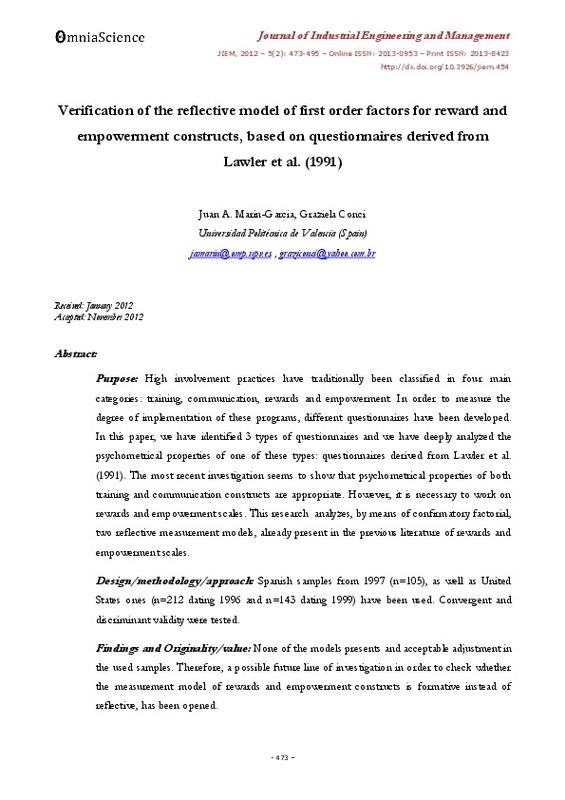JavaScript is disabled for your browser. Some features of this site may not work without it.
Buscar en RiuNet
Listar
Mi cuenta
Estadísticas
Ayuda RiuNet
Admin. UPV
Verification of the reflective model of first order factors for reward and empowerment constructs, based on questionnaires derived from Lawler et al. (1991)
Mostrar el registro sencillo del ítem
Ficheros en el ítem
| dc.contributor.author | Marín García, Juan Antonio
|
es_ES |
| dc.contributor.author | Conci, Graziela
|
es_ES |
| dc.date.accessioned | 2013-12-11T07:40:20Z | |
| dc.date.available | 2013-12-11T07:40:20Z | |
| dc.date.issued | 2012 | |
| dc.identifier.issn | 2013-0953 | |
| dc.identifier.uri | http://hdl.handle.net/10251/34427 | |
| dc.description.abstract | [EN] Purpose: High involvement practices have traditionally been classified in four main categories: training, communication, rewards and empowerment. In order to measure the degree of implementation of these programs, different questionnaires have been developed. In this paper, we have identified 3 types of questionnaires and we have deeply analyzed the psychometrical properties of one of these types: questionnaires derived from Lawler et al. (1991). The most recent investigation seems to show that psychometrical properties of both training and communication constructs are appropriate. However, it is necessary to work on rewards and empowerment scales. This research analyzes, by means of confirmatory factorial, two reflective measurement models, already present in the previous literature of rewards and empowerment scales. Design/methodology/approach: Spanish samples from 1997 (n=105), as well as United States ones (n=212 dating 1996 and n=143 dating 1999) have been used. Convergent and discriminant validity were tested. Findings and Originality/value: None of the models presents and acceptable adjustment in the used samples. Therefore, a possible future line of investigation in order to check whether the measurement model of rewards and empowerment constructs is formative instead of reflective, has been opened. Practical implications: Practitioners can profit from the results of this research because questionnaires validity will allow companies to have measurement and good practices diagnosis tools that can be used either for internal benchmarking or for the comparison with reference groups of companies. Originality/value: our paper identifies three questionnaire typologies used in the field of investigations of rewards and empowerment practices. We show that the point of view with which the scales of theses questionnaires have been treated has always been reflective. Moreover, this is one of the few papers that have checked the validity of the measurement model of questionnaires derived from Lawler et al. (1991). It questions the validity of a single questionnaire with similar samples, of different years, and simultaneously, with samples from same years but from different countries. | es_ES |
| dc.description.sponsorship | The work described in this paper has been supported by the project "CORSARI MAGIC DPI2010-18243" by the Ministerio de Ciencia e Innovación del Gobierno de España within the Program de "Proyectos de Investigación Fundamental No Orientada" | |
| dc.language | Inglés | es_ES |
| dc.publisher | OmniaScience | es_ES |
| dc.relation.ispartof | Journal of Industrial Engineering and Management | es_ES |
| dc.rights | Reconocimiento - No comercial (by-nc) | es_ES |
| dc.subject | HIWP | es_ES |
| dc.subject | Human Resource Management practices | es_ES |
| dc.subject | High Involvement | es_ES |
| dc.subject | Rewards | es_ES |
| dc.subject | Empowerment | es_ES |
| dc.subject.classification | ORGANIZACION DE EMPRESAS | es_ES |
| dc.title | Verification of the reflective model of first order factors for reward and empowerment constructs, based on questionnaires derived from Lawler et al. (1991) | es_ES |
| dc.type | Artículo | es_ES |
| dc.identifier.doi | 10.3926/jiem.454 | |
| dc.relation.projectID | info:eu-repo/grantAgreement/MICINN//DPI2010-18243/ES/COORDINACION DE OPERACIONES EN REDES DE SUMINISTRO%2FDEMANDA AJUSTADAS, RESILIENTES A LA INCERTIDUMBRE: MODELOS Y ALGORITMOS PARA LA GESTION DE LA INCERTIDUMBRE Y LA COMPLEJIDAD/ | es_ES |
| dc.rights.accessRights | Abierto | es_ES |
| dc.contributor.affiliation | Universitat Politècnica de València. Departamento de Organización de Empresas - Departament d'Organització d'Empreses | es_ES |
| dc.description.bibliographicCitation | Marín García, JA.; Conci, G. (2012). Verification of the reflective model of first order factors for reward and empowerment constructs, based on questionnaires derived from Lawler et al. (1991). Journal of Industrial Engineering and Management. 5(2):473-495. https://doi.org/10.3926/jiem.454 | es_ES |
| dc.description.accrualMethod | S | es_ES |
| dc.relation.publisherversion | http://dx.doi.org/10.3926/jiem.454 | es_ES |
| dc.description.upvformatpinicio | 473 | es_ES |
| dc.description.upvformatpfin | 495 | es_ES |
| dc.type.version | info:eu-repo/semantics/publishedVersion | es_ES |
| dc.description.volume | 5 | es_ES |
| dc.description.issue | 2 | es_ES |
| dc.relation.senia | 237474 | |
| dc.identifier.eissn | 2013-0953 | |
| dc.contributor.funder | Ministerio de Ciencia e Innovación |








